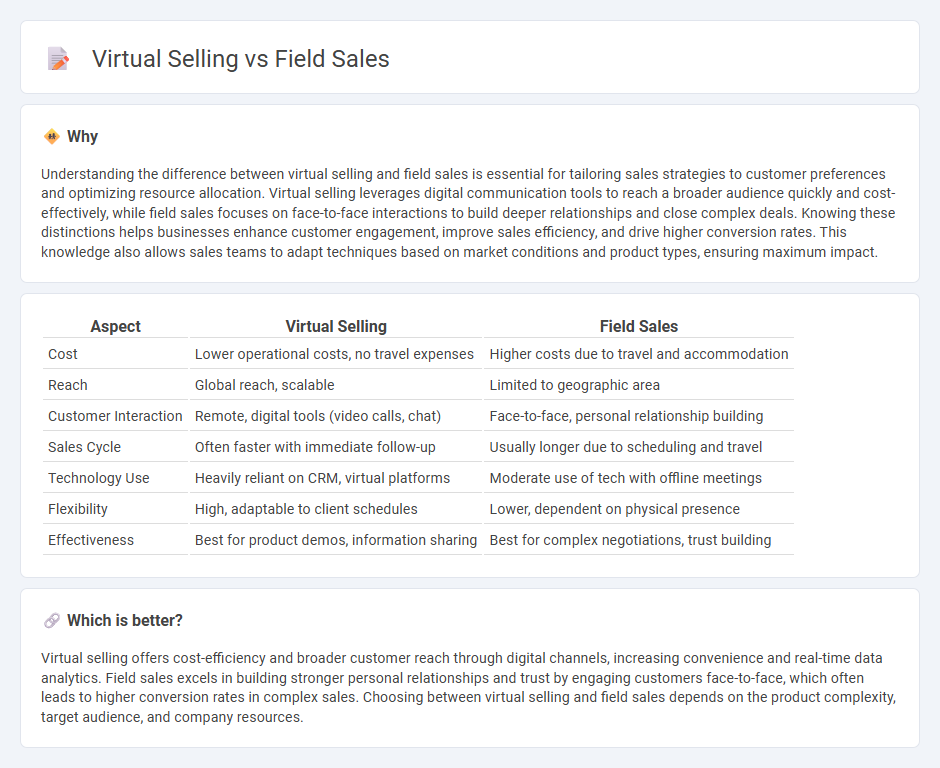
Virtual selling leverages digital technologies to engage customers remotely, reducing travel costs and enabling real-time analytics for personalized interactions. Field sales involve face-to-face meetings that build trust through in-person relationship-building and hands-on product demonstrations. Explore the strengths and strategies of both approaches to elevate your sales performance.
Why it is important
Understanding the difference between virtual selling and field sales is essential for tailoring sales strategies to customer preferences and optimizing resource allocation. Virtual selling leverages digital communication tools to reach a broader audience quickly and cost-effectively, while field sales focuses on face-to-face interactions to build deeper relationships and close complex deals. Knowing these distinctions helps businesses enhance customer engagement, improve sales efficiency, and drive higher conversion rates. This knowledge also allows sales teams to adapt techniques based on market conditions and product types, ensuring maximum impact.
Comparison Table
| Aspect | Virtual Selling | Field Sales |
|---|---|---|
| Cost | Lower operational costs, no travel expenses | Higher costs due to travel and accommodation |
| Reach | Global reach, scalable | Limited to geographic area |
| Customer Interaction | Remote, digital tools (video calls, chat) | Face-to-face, personal relationship building |
| Sales Cycle | Often faster with immediate follow-up | Usually longer due to scheduling and travel |
| Technology Use | Heavily reliant on CRM, virtual platforms | Moderate use of tech with offline meetings |
| Flexibility | High, adaptable to client schedules | Lower, dependent on physical presence |
| Effectiveness | Best for product demos, information sharing | Best for complex negotiations, trust building |
Which is better?
Virtual selling offers cost-efficiency and broader customer reach through digital channels, increasing convenience and real-time data analytics. Field sales excels in building stronger personal relationships and trust by engaging customers face-to-face, which often leads to higher conversion rates in complex sales. Choosing between virtual selling and field sales depends on the product complexity, target audience, and company resources.
Connection
Virtual selling and field sales are interconnected through the integration of digital tools that enhance customer engagement and streamline the sales process. Virtual selling leverages video conferencing, CRM platforms, and real-time data analytics to support field sales representatives in building relationships and closing deals remotely. This synergy increases sales efficiency, expands market reach, and allows real-time collaboration between sales teams and clients.
Key Terms
Face-to-Face Interaction
Field sales leverage direct face-to-face interaction to build trust and read non-verbal cues, significantly enhancing customer relationships. Virtual selling employs digital platforms, offering flexibility and wider reach but may lack the personal touch essential in complex negotiations. Explore detailed strategies to balance both methods for optimal sales performance.
Digital Communication
Field sales relies heavily on face-to-face interactions, leveraging physical presence to build trust and demonstrate products directly to clients. Virtual selling emphasizes digital communication tools such as video calls, email, and social media to engage prospects remotely, enhancing reach and flexibility. Explore how digital communication transforms traditional sales strategies and boosts productivity in the evolving sales landscape.
Territory Management
Territory management in field sales involves direct, face-to-face customer interactions, enabling real-time relationship building and on-the-ground market insights. Virtual selling relies heavily on digital tools and CRM platforms to optimize customer segmentation and scheduling, enhancing efficiency across widespread territories. Explore how blending field sales and virtual selling strategies can maximize territory management effectiveness.
Source and External Links
What is Field Sales? A Complete Guide to Maximizing In-Person ... - Field sales, or "outside sales," involves sales reps meeting clients face-to-face to build relationships and close complex or high-value deals, maintaining importance despite digital trends.
What Is Field Sales And Why Is It Important? - LeadSquared - Field sales is a process where reps go out to the market to find, contact, and sell directly to prospects, essential especially for companies with complex or high-priced products.
What is Field Sales? (Explained With Examples) - Breakcold CRM - Field sales entails in-person product or service selling, allowing reps to tailor solutions based on direct customer interactions and gain valuable market insights.
 dowidth.com
dowidth.com